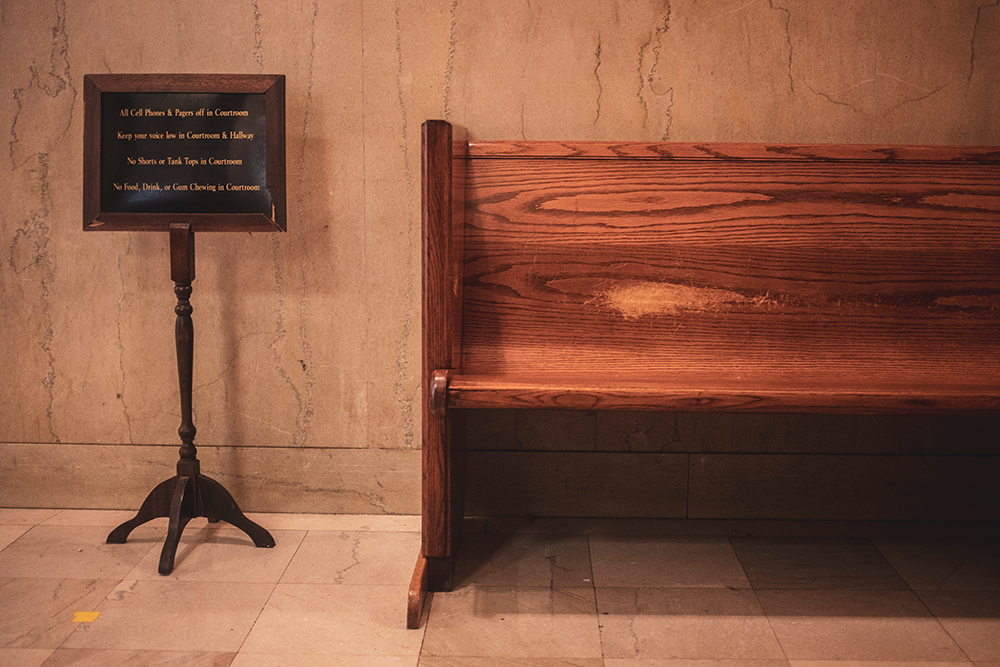* This story was originally published by MLK50: Justice Through Journalism. Subscribe to their newsletter here.
When tenants on the verge of eviction show up at Shelby County General Sessions Court, most don’t know what their hearing will be like or what they’re supposed to say. And many haven’t heard that millions of federal dollars have been set aside to help people in their situation.
All six General Sessions Civil Court judges — who were all up for re-election this year — know about the Emergency Rental Assistance (ERA) funds, but only three brought it up during court, MLK50: Justice Through Journalism journalists found.
To report this story, MLK50 journalists sat through hearings in front of all six judges over the course of three weeks, observing at least 10 eviction cases in which the tenant came to court in each courtroom.
Judges Lynn Cobb, Lonnie Thompson, and Phyllis Gardner didn’t refer any tenants to the local ERA program. Cobb said these referrals aren’t necessary, Thompson questioned whether doing so would unfairly favor tenants, and Gardner said she frequently tells people about the funds, but it depends on the tenant.
Experts acknowledged the value of objectivity but said the scales are currently tipped toward landlords.
“[Some judges] think impartiality means getting through the process as dictated by statute,” said Jesse McCoy, a Duke University School of Law professor who spends much of his time on evictions. “The problem is the statutes themselves are designed by people who are mostly landlords. … The system is not really designed for neutrality.”
When tenants arrive at court, they go to whichever of the six courtrooms they’ve been randomly assigned. Their judge might explain all the proceedings and connect them with the federal funding. Or, their judge may tell them little about anything.
Based on the luck of the draw, tenants may leave just as confused as they came, with 10 days to vacate their home.

What do these judges do?
The General Sessions judges handle tens of thousands of eviction filings every year.
Each one carries the potential to drive someone further into poverty by pushing them toward worse housing, ruining their credit, and cutting them off from the community they depend upon.
“[People experiencing poverty] rely on neighbors for childcare and rely on neighbors for transportation,” McCoy said. “They were very selective in where they signed a lease.”
Need rental assistance?
Shelby County accepts new applications for Emergency Rental Assistance during the first two weeks of the month, except from people who are imminently facing eviction. Check the MLK50 website to find more information about applying, or call 211. And, because evictions are frequently caused by job loss, McCoy said evictions often force people to search for housing and jobs simultaneously.
Despite this large responsibility falling on General Sessions judges, their elections received little public scrutiny, whether measured in media attention or the size of yard signs. More than 150 races were on Shelby County’s August 4th ballot, and some judges admitted that most voters will choose whether or not to reelect them based on little information.
“Maybe one in 5,000 [Shelby County residents] knows what we do,” Judge Danielle Mitchell Sims said.
In broad terms, the judges — who each receive a salary of more than $183,000 — handle non-criminal cases that involve less than $25,000. Evictions and bill collection make up a large portion of their caseload, but they have a few other responsibilities, including emergency mental health commitments.
With eviction specifically, most of the judges spoke about being constrained by state law, which is widely considered landlord-friendly in comparison to other states.
Judge Deborah Henderson agreed with this characterization.
“Apparently, the landlords have a very strong lobbyist group,” she said. “They have done well for the landlords in getting laws passed that are beneficial to landlords. It doesn’t give us a lot of wiggle room.”
Judge Betty Thomas Moore said the state needs new legislation, especially given the rise of out-of-town investors who show no care for their tenants and don’t maintain their properties. In the meantime, though, she says she will continue to apply the law as written but also show kindness to tenants whenever possible — including encouraging landlords to give tenants extra days to move, as MLK50 observed.

Which judges help tenants get help?
Emergency Rental Assistance can provide a whole lot of cash.
For tenants who qualify, the program will cover up to 12 months of past-due rent and two months of future rent. If landlords are willing to accept the funds, the program sends them a check and the tenant remains in their home. If not, the program gives the money directly to tenants, to help them find their next rental. In Shelby County, the program has covered rent more than 20,000 times, to the tune of more than $56 million since launching in March 2021.
Many of these tenants ended up in the program after judges advised they stop by an office at the courthouse where its representatives sit.
Thomas Moore and Mitchell Sims referred every tenant MLK50 journalists observed them interact with, and Henderson referred some as well. Judges Thompson, Gardner, and Cobb did not. Those who introduced tenants to the program all told MLK50 they didn’t see any reason not to provide such a helpful resource.
“Because I know what [the program] can do for our community, I make sure to refer to it all the time, every time,” Thomas Moore said. “[The other judges] have been getting information about the program. They know about the program. … Why they aren’t [all referring], I really can’t answer.”
Henderson said she tries to consistently refer to the program unless it’s a tenant’s second time at court, in which case she assumes they were advised about the program on their first trip.
Gardner said she only refers tenants who she thinks would be a good fit for the assistance. Though she didn’t bring up the program while MLK50 observed, she spoke highly of the program and its lawyers. And she was quick to let a tenant reverse her consent to an eviction when informed her application to the program was pending. Gardner, who was the only of the six judges running unopposed, says she tries to avoid being too much of a “proponent” for the program, given the need for impartiality.
Thompson worries about the ethics of a judge “aggressively pushing” for the rental assistance. He said he has brought it up to tenants in the past but wants to make sure he doesn’t “legislate from the bench.”
“That’s not to say we’re not going to be helpful,” Thompson said. “[But] the judge is not a social worker.”
Cobb said he simply doesn’t see the need for judges to inform tenants of the program.
“[Tenants] know the [ERA] program is available,” Cobb said. “[Also,] there’s a whole office over [around the corner].”
Cobb didn’t say how he knows tenants are aware of the program, and he declined to answer more than a few questions.
Flyers for the program are posted outside all of the courtrooms except Henderson’s. But, the chair of the Memphis Bar Association’s Access to Justice Committee, Danielle Woods, said most tenants don’t know about rental assistance, which isn’t surprising since it’s less than two years old. Many tenants also don’t know they can seek help from Memphis Area Legal Services despite it being around for decades, she said.
When asked if there are any judges that handle eviction cases especially well, Woods praised Henderson and Thomas Moore.
“Henderson usually does a fantastic job of making sure people understand what’s going on and then asking about the ERA program. It may not be every single time, but it is an overwhelming amount of the time,” Woods said. “Same with Betty Thomas Moore — she’s very good about trying to explain as much as she can from the bench. … She is probably going above and beyond.”

How do they make court less scary?
In a recent case before Thomas Moore, a Bartlett apartment complex was evicting a 20-year resident who was hard of hearing. Instead of asking the elderly man to come closer, Thomas Moore stood up and climbed over the low wall separating her perch from the empty witness stand. She then walked over to the man and smiled. The last time he was here she had suggested he apply for Emergency Rental Assistance and had delayed his case so he could do so. Now, he told her he didn’t know the status of his application.
So, Thomas Moore summoned a program representative from the office down the hall. His application had been approved, the representative said, but the landlord rejected the payment, which the landlord’s lawyer in the courtroom confirmed.
Thomas Moore explained to the man that he would still have to move from the property and that his landlord was still going to seek back payment but that he would soon be receiving an Emergency Rental Assistance check. He didn’t seem to fully grasp what she had said, so she explained it again in a slightly different way. And then a third time, asking each time if he had any questions. At the end of the hearing, an eviction judgment was granted against him, but he and his son-in-law expressed gratitude for her help and patience.
The whole interaction occurred in stark contrast to proceedings MLK50 watched in the courtroom next door, run by Thompson. Thompson worked through his cases quickly and didn’t take much time for explanations or tenants’ questions. Once, when a tenant asked what his ruling meant, he simply repeated that she could talk to her landlord’s representatives if she had any questions. When another tenant tried to talk after he had granted an eviction judgment, he cut her off with a simple “That’s all.”
He told MLK50 that he usually does answer tenants’ questions, but he also tries to be efficient with everyone’s time. Despite large caseloads, he said he makes sure not to run his courtroom “like a factory.”
Cobb moves just as quickly as Thompson, which he said is intentional; he wants to get tenants and lawyers back to their workplaces quickly. But compared to Thompson, Cobb’s cadence and demeanor were much more relaxed — using folksy mannerisms and telling jokes in his deep Southern drawl — other than when he yelled at a woman who didn’t remove her mask when addressing him after he had instructed all tenants to do so.
“I hope I’m making a difference helping people realize the law is not intimidating,” he said.
Gardner — who spends more time on each case, though not as much as Thomas Moore — agrees that calming tenants is an important part of the job. She uses small talk, compliments, and jokes to accomplish this.
“Everybody is scared when they come to court. They think they’re going to jail,” Gardner said. “The worst thing a judge can do is use her authority to browbeat people who are already terrified.”
Henderson and Thompson didn’t necessarily “browbeat” tenants but kept small talk to a minimum and chastised tenants for things such as wearing ripped jeans or not standing up when their name was called.
Thomas Moore cautioned against drawing too many conclusions from other judges’ curt responses, saying they need to keep control of their courtrooms and are entitled to bad days. She, though, was slower to rebuke tenants, even when they spoke out of turn, MLK50 observed.
She said this extra compassion toward struggling tenants is likely because she used to be closer to their situation than to her current one — back when she was raising four kids on her own.
“But for the grace of God … I could still be in that position [the tenants are in],” she said. “God has blessed me to be in a better position. And so my job is to do the best that I can for the people that come through.”

Which judges explain what’s happening?
Eviction cases often hinge around a single moment, when judges ask the tenants whether they agree or disagree they owe their landlord money.
If tenants answer “agree,” the judge grants the eviction, since Tennessee law allows for evictions whenever a tenant owes money, except in some rare circumstances. If they disagree, their case will be set for trial — with the tenants likely representing themselves — either later that day or within a couple of weeks.
However, most of the judges fail to explain the question and its implications to tenants. And after court, many tenants told MLK50 they didn’t understand what had happened.
After a case is called and the landlord’s lawyer has read the amount owed, Thompson, Henderson, Gardner, and Mitchell Sims simply ask the tenant, “Do you agree or disagree?” Cobb’s wording makes it clearer that the tenant is confirming they owe the landlord money but not that their landlord will be given the right to evict if they agree.
Mitchell Sims, who was appointed by the Shelby County Board of Commissioners in 2021, said she adopted the “agree or disagree” question from other judges but would like to eventually come up with a better one because tenants get confused.
Thompson said that while the question’s implications may not be apparent, the question itself isn’t difficult to comprehend. And if tenants confirm that they owe money, it’s up to the landlord — not him — whether or not tenants should be given extra time to work something out.
After they agree they owe money or lose their trial, tenants have 10 days to vacate their homes unless they cut a deal with their landlord. This, though, was only consistently explained to tenants by half of the judges: Thomas Moore, Henderson, and Gardner. And tenants coming out of the other courtrooms told MLK50 they didn’t understand they only had a week and a half to find their next home.
After he hears “agree,” Cobb would say, “You can talk to the resident manager about working out payments.” Then he would move on to the next case.
Thompson and Mitchell Sims usually didn’t tell tenants how long they had to leave their homes. After MLK50 brought this to Mitchell Sims’ attention, she said she’ll work harder to be consistently clear with tenants.
Being clear with tenants is the best way to be helpful while remaining impartial, said Vanessa Bullock, housing managing attorney for West Tennessee Legal Services.
“[Judges] don’t realize that some of the speeches they’re making don’t make sense to the lay people they’re talking to,” Bullock said.
Jargon is one of multiple ways judges can unintentionally favor landlords — who are almost always represented by attorneys — over tenants. She said these disparities may not be apparent to the judges themselves but certainly are to most casual observers.
“If you think things are fair and just in this world, go sit in the General Sessions courtroom and watch what happens to the really poor people,” Bullock said. “Everybody deserves to at least know what’s going on and not be sitting in a room going, ‘I don’t know what’s happening.’”
Every Shelby County General Sessions Court judge retained their seat in the August 4th election.
MLK50 journalists Andrea Morales, Wendi C. Thomas, and Brittany Brown contributed to this article.
